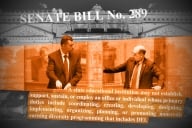You have /5 articles left.
Sign up for a free account or log in.
Jo Boaler's career has all the hallmarks of success. She is a full professor at Stanford University. She receives grants from the National Science Foundation and other funders for her research on mathematics education. She consults with educators on her ideas on mathematics education -- hailed by many as ground-breaking -- in several countries. Her work appears in the leading peer-reviewed journals in the field. And she has also published for a general audience, with What's Math Got to Do With It? How Parents and Teachers Can Help Children to Love Their Least Favorite Subject (Penguin).
The book's title reflects her expertise. Boaler is in the "reform" school of thought about mathematics education. She argues that new approaches -- group work, real-life examples and solving problems students can relate to -- have the potential to transform the way students interact with mathematics. Traditional methods, which emphasize students learning key principles and facts, have resulted in schools in which too many students feel early on that they just "don't get math," and shy away from the subject.
Boaler's research -- which includes control group studies in which different groups of students were taught in different ways -- suggests that her approaches work, and that they work for many demographic groups that have had on average lower success rates with mathematics than other groups.
So why does Boaler feel under siege?
On Friday night, she published on her own website an account of what she terms unfair personal and professional attacks by two senior mathematics scholars, and by some of their supporters, against her and her work. Her essay -- subtitled "When Academic Disagreement Becomes Harassment and Persecution" -- quickly spread on Twitter and Facebook, and e-mail lists of mathematics educators shared the commentary. Many of those who knew of the attacks said that they were pleased that they were finally coming into public view. Others, who knew of Boaler but not what she has experienced, expressed shock.
The two scholars Boaler accused are James Milgram, an emeritus professor of mathematics at Stanford, and Wayne Bishop, a professor of mathematics at California State University at Los Angeles. Only Milgram could be reached this weekend, and he stood behind his comments, although he acknowledged a key point of Boaler's -- that the summary of the Milgram/Bishop critique of her work that they and supporters have circulated widely has never been published anywhere but on Milgram's website.
The "math wars" have raged since the 1990s. A series of reform efforts (of which Boaler's work is a part) have won support from many scholars and a growing number of school districts. But a traditionalist school (of which Milgram and Bishop are part) has pushed back, arguing that rigor and standards are being sacrificed. Both sides accuse the other of oversimplifying the other's arguments, and studies and op-eds from proponents of the various positions appear regularly in education journals and the popular press. Several mathematics education experts interviewed for this article who are supportive of Boaler and her views stressed that they did not view all, or even most, criticism from the "traditionalist" camp as irresponsible.
The essay Boaler published Friday night noted that there has been "spirited academic debate" about her ideas and those of others in mathematics education, and she says that there is nothing wrong with that.
"Milgram and Bishop have gone beyond the bounds of reasoned discourse in a campaign to systematically suppress empirical evidence that contradicts their stance," Boaler wrote. "Academic disagreement is an inevitable consequence of academic freedom, and I welcome it. However, responsible disagreement and academic bullying are not the same thing. Milgram and Bishop have engaged in a range of tactics to discredit me and damage my work which I have now decided to make public."
Some experts who have been watching the debate say that the reason this dispute is important is because Boaler's work is not based simply on a critique of traditional methods of teaching math, but because she has data to back up her views.
Keith Devlin, director of the Human Sciences and Technologies Advanced Research Institute at Stanford, said that he has "enormous respect" for Boaler, although he characterized himself as someone who doesn't know her well, but has read her work and is sympathetic to it. He said that he shares her views, but that he does so "based on my own experience and from reading the work of others," not from his own research. So he said that while he has also faced "unprofessional" attacks when he has expressed those views, he hasn't attracted the same level of criticism as has Boaler.
Of her critics, Devlin said that "I suspect they fear her because she brings hard data that threatens their view of how children should be taught mathematics." He said that the criticisms of Boaler reach "the point of character assassination."
Debating the Data
The Milgram/Bishop essay that Boaler said has unfairly damaged her reputation is called "A Close Examination of Jo Boaler's Railside Report," and appears on Milgram's Stanford website. ("Railside" refers to one of the schools Boaler studied.) The piece says that Boaler's claims are "grossly exaggerated," and yet expresses fear that they could be influential and so need to be rebutted. Under federal privacy protection requirements for work involving schoolchildren, Boaler agreed to keep confidential the schools she studied and, by extension, information about teachers and students. The Milgram/Bishop essay claims to have identified some of those schools and says this is why they were able to challenge her data.
Boaler said -- in her essay and in an interview -- that this puts her in a bind. She cannot reveal more about the schools without violating confidentiality pledges, even though she is being accused of distorting data. While the essay by Milgram and Bishop looks like a journal article, Boaler notes that it has in fact never been published, in contrast to her work, which has been subjected to peer review in multiple journals and by various funding agencies.
Further, she notes that Milgram's and Bishop's accusations were investigated by Stanford when Milgram in 2006 made a formal charge of research misconduct against her, questioning the validity of her data collection. She notes in her new essay that the charges "could have destroyed my career." Boaler said that her final copy of the initial investigation was deemed confidential by the university, but she provided a copy of the conclusions, which rejected the idea that there had been any misconduct.
Here is the conclusion of that report: "We understand that there is a currently ongoing (and apparently passionate) debate in the mathematics education field concerning the best approaches and methods to be applied in teaching mathematics. It is not our task under Stanford's policy to determine who is 'right' and who is 'wrong' in this academic debate. We do note that Dr. Boaler's responses to the questions put to her related to her report were thorough, thoughtful, and offered her scientific rationale for each of the questions underlying the allegations. We found no evidence of scientific misconduct or fraudulent behavior related to the content of the report in question. In short, we find that the allegations (such as they are) of scientific misconduct do not have substance."
Even though the only body to examine the accusations made by Milgram rejected them, and even though the Milgram/Bishop essay has never been published beyond Milgram's website, the accusations in the essay have followed Boaler all over as supporters of Milgram and Bishop cite the essay to question Boaler's ethics. For example, an article she and a co-author wrote about her research that was published in a leading journal in education research, Teachers College Record, attracted a comment that said the findings were "imaginative" and asked if they were "a prime example of data cooking." The only evidence offered: a link to the Milgram/Bishop essay.
In an interview, Boaler said that, for many years, she has simply tried to ignore what she considers to be unprofessional, unfair criticism. But she said she was prompted to speak out after thinking about the fallout from an experience this year when Irish educational authorities brought her in to consult on math education. When she wrote an op-ed in The Irish Times, a commenter suggested that her ideas be treated with "great skepticism" because they had been challenged by prominent professors, including one at her own university. Again, the evidence offered was a link to the Stanford URL of the Milgram/Bishop essay.
"This guy Milgram has this on a webpage. He has it on a Stanford site. They have a campaign that everywhere I publish, somebody puts up a link to that saying 'she makes up data,' " Boaler said. "They are stopping me from being able to do my job."
She said one reason she decided to go public is that doing so gives her a link she can use whenever she sees a link to the essay attacking her work.
Bishop did not respond to e-mail messages requesting comment about Boaler's essay. Milgram via e-mail answered a few questions about Boaler's essay. He said she inaccurately characterized a meeting they had after she arrived at Stanford. (She said he discouraged her from writing about math education.) Milgram denied engaging in "academic bullying."
He said via e-mail that the essay was prepared for publication in a journal and was scheduled to be published, but "the HR person at Stanford has some reservations because it turned out that it was too easy to do a Google search on some of the quotes in the paper and thereby identify the schools involved. At that point I had so many other things that I had to attend to that I didn't bother to make the corrections." He also said that he has heard more from the school since he wrote the essay, and that these additional discussions confirm his criticism of Boaler's work.
In an interview Sunday afternoon, Milgram said that by "HR" in the above quote, he meant "human research," referring to the office at Stanford that works to protect human subjects in research. He also said that since it was only those issues that prevented publication, his critique was in fact peer-reviewed, just not published.
Further, he said that Stanford's investigation of Boaler was not handled well, and that those on the committee considered the issue "too delicate and too hot a potato." He said he stood behind everything in the paper. As to Boaler's overall criticism of him, he said that he would "have discussions with legal people, and I'll see if there is an appropriate action to be taken, but my own inclination is to ignore it."
Milgram also rejected the idea that it was not appropriate for him to speak out on these issues as he has. He said he first got involved in raising questions about research on math education as the request of an assistant in the office of Rod Paige, who held the job of U.S. education secretary during the first term of President George W. Bush.
Ze'ev Wurman, a supporter of Milgram and Bishop, and one who has posted the link to their article elsewhere, said he wasn't bothered by its never having been published. "She is basically using the fact that it was not published to undermine its worth rather than argue the specific charges leveled there by serious academics," he said.
Critiques 'Without Merit'
E-mail requests for comment from several leading figures in mathematics education resulted in strong endorsements of Boaler's work and frustration at how she has been treated over the years.
Jeremy Kilpatrick, a professor of mathematics education at the University of Georgia who has chaired commissions on the subject for the National Research Council and the Rand Corporation, said that "I have long had great respect for Jo Boaler and her work, and I have been very disturbed that it has been attacked as faulty or disingenuous. I have been receiving multiple e-mails from people who are disconcerted at the way she has been treated by Wayne Bishop and Jim Milgram. The critiques by Bishop and Milgram of her work are totally without merit and unprofessional. I'm pleased that she has come forward at last to give her side of the story, and I hope that others will see and understand how badly she has been treated."
Alan H. Schoenfeld is the Elizabeth and Edward Conner Professor of Education at the University of California at Berkeley, and a past president of the American Educational Research Association and past vice president of the National Academy of Education. He was reached in Sweden, where he said his e-mail has been full of commentary about Boaler's Friday post. "Boaler is a very solid researcher. You don't get to be a professor at Stanford, or the Marie Curie Professor of Mathematics Education at the University of Sussex [the position she held previously], unless you do consistently high quality, peer-reviewed research."
Schoenfeld said that the discussion of Boaler's work "fits into the context of the math wars, which have sometimes been argued on principle, but in the hands of a few partisans, been vicious and vitriolic." He said that he is on a number of informal mathematics education networks, and that the response to Boaler's essay "has been swift and, most generally, one of shock and support for Boaler." One question being asked, he said, is why Boaler was investigated and no university has investigated the way Milgram and Bishop have treated her.
A spokeswoman for Stanford said the following via e-mail: "Dr. Boaler is a nationally respected scholar in the field of math education. Since her arrival more than a decade ago, Stanford has provided extensive support for Dr. Boaler as she has engaged in scholarship in this field, which is one in which there is wide-ranging academic opinion. At the same time, Stanford has carefully respected the fundamental principle of academic freedom: the merits of a position are to be determined by scholarly debate, rather than by having the university arbitrate or interfere in the academic discourse."
Boaler in Her Own Words
Here is a YouTube video of Boaler discussing and demonstrating her ideas about math education with a group of high school students in Britain.




